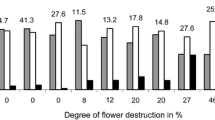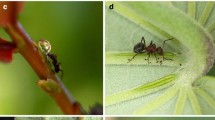Abstract.
We studied the relationship between Hirtella myrmecophila (Chrysobalanaceae), a common but little-studied Amazonian ant-plant that produces leaf-pouches as domatia, and its obligate ant partner, Allomerus octoarticulatus. Field observations revealed that H. myrmecophila drops domatia from older leaves, a characteristic that is unique among myrmecophytes. The physiological mechanism for abortion of domatia is currently unknown, but this characteristic allows for the existence, within the same plant, of branches with and without ants. Older branches generally bear only old leaves with no domatia and therefore have no ants, whereas younger branches have leaves of various ages. Ants forage mainly on new leaves, and experimental removal of ants showed that A. octoarticulatus is crucial for defense of these leaves against insect herbivores. However, A. octoarticulatus also acts as a castration parasite, severing the plant's inflorescences. Mature flowers and fruits were only found on older branches with no ants, and flower production was 8 times greater on plants whose ants were experimentally removed than on control plants. Given the reproductive costs inflicted by its mutualistic partner, we suggest that abortion of domatia is a strategy developed by H. myrmecophila to minimize the effects of cheating by A. octoarticulatus. These results support the view that evolutionary conflicts of interest between mutualistic species often impose selection for cheating on the partner, as well as for mechanisms to retaliate or to prevent super-exploitation. Opposing selection pressures, operating independently on the two partners, probably help to maintain the evolutionary stability of this mutualistic relationship.
Similar content being viewed by others
Author information
Authors and Affiliations
Corresponding author
Additional information
Electronic Publication
Rights and permissions
About this article
Cite this article
Izzo, T.J., Vasconcelos, H.L. Cheating the cheater: domatia loss minimizes the effects of ant castration in an Amazonian ant-plant. Oecologia 133, 200–205 (2002). https://doi.org/10.1007/s00442-002-1027-0
Received:
Accepted:
Published:
Issue Date:
DOI: https://doi.org/10.1007/s00442-002-1027-0




